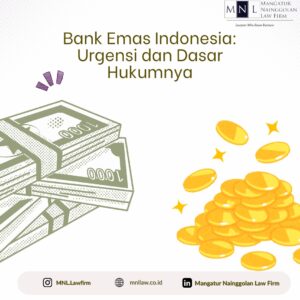
One of Indonesia’s abundant natural resources is gold, which is found across the country, from Aceh, North Sumatra, Bengkulu, to Papua. This indicates that Indonesia’s gold potential is highly promising for the national economy, considering that the limited supply of gold causes its price to increase annually. However, Indonesia has not yet established a storage facility for mined gold, resulting in its uncontrolled exportation abroad.
Therefore, on February 26, 2025, President Prabowo inaugurated the gold bank, or bullion bank, to harness Indonesia’s significant gold potential and reduce reliance on raw materials. The establishment of the gold bank is legally based on the Financial Sector Development and Strengthening Law (UU P2SK), which was enacted on January 12, 2023, and further elaborated in Financial Services Authority Regulation (POJK) No. 17 of 2024 on the Implementation of Bullion Business Activities.
Article 1 point (1) of POJK No. 17 of 2024 states:
“Bullion Business Activities refer to business activities related to gold carried out by financial service institutions.”
The gold bank, or bullion bank, is the first of its kind in Indonesia, and under Article 2 paragraph (1) of the POJK, its activities include:
a. Gold Deposits;
b. Gold Financing;
c. Gold Trading;
d. Gold Custody.
The purpose and benefit of the gold bank in Indonesia are to strengthen the national gold industry ecosystem. The establishment of the gold bank supports the downstream processing strategy initiated by President Prabowo, ensuring that mined gold is stored in the gold bank before being exported.
Furthermore, the gold bank plays a vital role in optimizing the country’s foreign exchange reserves, as it pertains to Indonesia’s monetary gold. Foreign exchange reserves serve multiple functions, including financing international trade, repaying foreign debt, facilitating import and export transactions, serving as a source of national revenue, and supporting economic growth.
The gold banking system will operate similarly to conventional banks. Gold deposited by the public will be utilized by the bank, including through lending to business entities in need, while depositors will receive returns similar to interest-bearing deposits.
Accordingly, the inauguration of the Gold Bank is not merely the establishment of a new financial institution but a strategic initiative to maximize Indonesia’s vast natural resources in strengthening the national economy and foreign exchange reserves.
